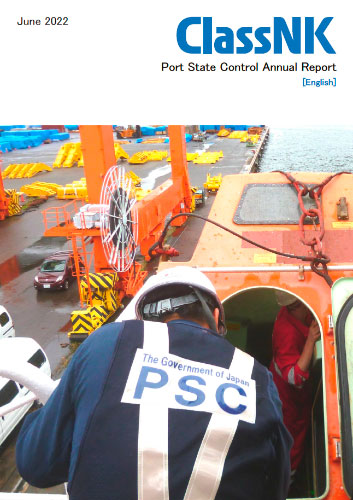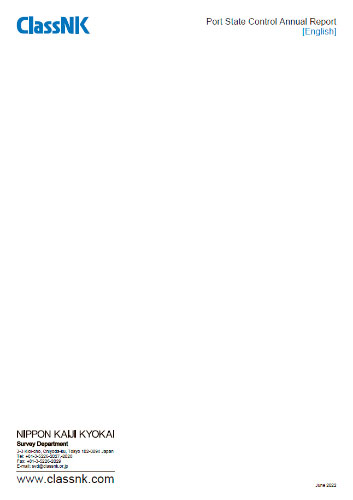Port State Control Annual Report/Годовой отчет Государственного портового контроля
Книга на английском языке.
This Annual Report on Port State Control (PSC) summarizes deficiencies identified during PSC inspections carried out in various countries around the world. This report is prepared with the objective of building awareness of the present state of PSC and thereby improving future onboard maintenance and inspections as well as Safety Management Systems.
Contents
Chapter 1. Status of Implementation and Recent Developments in PSC Worldwide
1.1 Amendments to the relevant conventions
1.1.1 EU Regulation on Ship Recycling
1.1.2 2020 global cap of sulphur content in fuel oils
1.1.3 Fitting or designation fuel oil sampling points
1.1.4 Maintenance for lifeboats etc.
1.1.5 Electronic record books
1.1.6 Application of Cyber Risk Management
1.1.7 Sampling analysis commissioning tests for ballast water management systems
1.1.8 Short-term measures for reduction of CHG
1.2 Recent global developments
1.2.1 MOUs around the world
(1) European and North Atlantic region (Paris MoU)
(2) Asia-Pacific region (Tokyo MOU)
(3) Latin-American region (Latin American Agreement)
(4) Caribbean region (Caribbean MOU)
(5) Mediterranean region (Mediterranean MoU)
(6) Indian Ocean region (Indian Ocean MOU)
(7) Black Sea region (Black Sea MOU)
(8) West and Central Africa region (Abuja MoU)
(9) Arab States of the Gulf (Riyadh MoU
1.2.2 Port State Control in the United States (USCG)
1.3 Measures adopted by ClassNK
1.3.1 Handling of the Deficiencies Identified by PSC Inspections
(1) Cooperative assistance with PSC and treatment of the deficiencies
(2) Treatment of inspection reports by PSC officers
1.3.2 Minimizing the number of detained ships in order to reduce substandard ships
(1) Special training at several in-house meetings
(2) Meetings and informal gatherings with management companies
1.3.3 Visits to PSC authorities
Chapter 2. Statistical Analysis of Detained Ships Registered with ClassNK
2.1 General
2.2 Data on Detentions
2.2.1 Detentions per Flag State
2.2.2 Detentions per Ship Type
2.2.3 Detentions per Ship’s Age
2.2.4 Detentions per Ship Size (Gross Tonnage)
2.2.5 Detentions per PSC Country
2.2.6 Detentions per MOUs and USCG
2.3 Analysis of Detainable Deficiencies
2.3.1 Detainable Deficiencies per Category
2.3.2 Frequently Reported Deficiencies
2.4 Analysis of Detainable Deficiencies per PSC Country
2.4.10 Australia
2.4.20 Russia
2.4.30 Indonesia
2.4.40 China
2.4.50 Italy
2.4.60 Belgium
2.4.70 United States
2.4.80 Canada
2.4.90 Saudi Arabia Canada
2.4.10 United Kingdom
2.4.11 Germany
2.4.12 Japan
Chapter 3. Statistical Analysis of NK SMC Ships Detained by PSC (ISM Code)
3.1 General
3.2 Statistics of Detentions of NK SMC Ships
3.3 Analysis of ISM Detainable Deficiencies
3.3.1 Australia
3.3.2 Belgium
3.3.3 USA
Chapter 4. Statistical Analysis of NK MLC Ships Detained by PSC (MLC, 2006)
4.1 General
4.2 Statistics of Detentions of NK MLC Ships
4.3 Study of MLC Detainable Deficiencies
Chapter 5. Statistical Data from Tokyo MOU, Paris MoU and USCG
5.1 Tokyo MOU
5.1.1 Port State Inspections carried out by Authorities
5.1.2 Port State Inspections carried out remotely
5.1.3 Black List of Flag States
5.1.4 Recognized Organization Performance
5.1.5 Deficiencies per Category
5.2 Paris MoU
5.2.1 Port State Inspections carried out by Authorities
5.2.2 Black List of Flag States
5.2.3 Recognized Organization Performance
5.3 USCG
5.3.1 USCG Statistics
5.3.2 Targeted Flag States (Safety)
5.3.3 Recognized Organization Performance (Safety)




